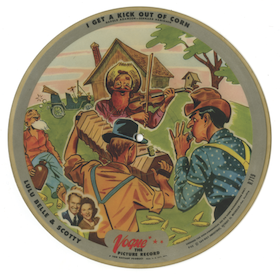Mayrent Institute symposium asks ‘Who owns sound culture?’
Who owns music? Musicians who compose, perform and record something? Music companies that sell recordings? Consumers who buy copies of the recordings?

The Mayrent Institute for Yiddish Culture’s collection of 9,000 Yiddish 78 rpm recordings is the largest private assemblage of its kind.
These are questions that swirl around contentious issues like end-user license agreements and anti-piracy laws, as well as the growing divide between musicians who create work in home sound studios and the mega-stars who work with major corporations.
They may seem like fundamentally contemporary questions, but in one form or another, versions of these issues go back as long as the history of sound recording itself, and they have an ongoing life as contemporary listeners try to learn about and from historical recordings.
The Mayrent Institute for Yiddish Culture at UW–Madison will host a free public symposium that considers issues of ownership, rights, and access as they relate to recorded popular and folk music on Thursday, March 14, from 2-5:30 p.m. and Friday, March 15, from 9 a.m.-5:45 p.m. in the Education Building.
Titled “World Records: The Mayrent Collection of Yiddish 78s and the Future of Historic Sound Recordings,” the symposium will celebrate the Mayrent Collection of 9,000 Yiddish 78 rpm recordings — the largest private assemblage of its kind — that was recently donated to the Mills Music Library. Taking the Mayrent Collection as a starting point, the symposium will examine the past, present, and future meanings of period sound recordings, with discussions of both Yiddish music and other American vernacular music.
Papers and panels on the background and history of important American vernacular and folk recordings (hillbilly, Scandihoovian, Polish, Yiddish and Yugoslavian music) will be augmented by presentations on critical issues within the world of libraries and archives including digital folklore, collection management, the history of sound archives, and issues of copyright and intellectual property — most importantly, the role of free and open access — related to these rare and irreplaceable period documents.
Highlights of the conference will be keynote addresses by Nancy Groce, folklife specialist of the American Folklife Center of the Library of Congress (Thursday, March 14, 2 p.m.) and Ken Frazier, emeritus director of the UW-Madison Libraries (Friday, March 15, 4:45 p.m.).
The symposium will also include a concert featuring music found in the 78 rpm collections at the Mills Music Library with performances by Richard March (Yugoslavia/tamburitza), Bruce Bollerud (Scandihoovian/Goose Island Ramblers), The New Mad City Ramblers (Hillbilly/Bill Malone, Tim Meehan, and Henry Sapoznik), and klezmer music with Sherry Mayrent.
Papers will be delivered in the Education Building, room 159. The concert will be in Morphy Hall in the Mosse Humanities Building.
Full information and registration can be found here.
World Records is a program of the Mayrent Institute for Yiddish Culture of the UW–Madison, a part of the Mosse/Weinstein Center for Jewish Studies, and is co-sponsored by the Center for the Study of Upper Midwestern Cultures, Department of Comparative Literature & Folklore Studies, School of Music, and the UW–Madison General Library System.
Tags: arts




